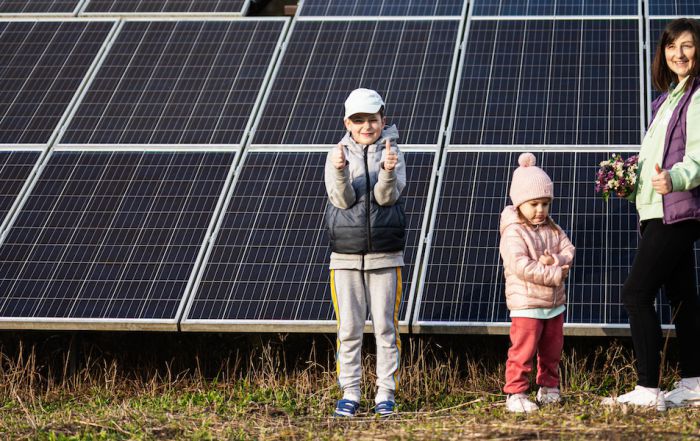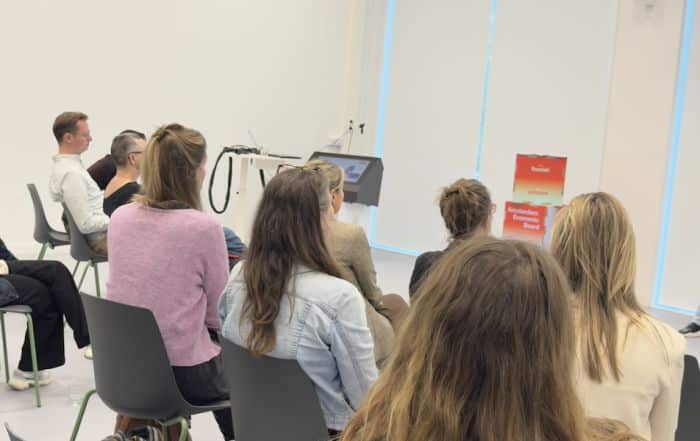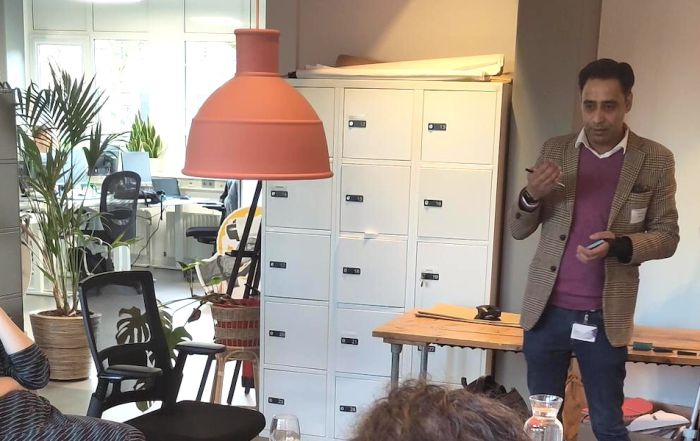Energiebesparing als oplossing voor netcongestie
Flexibel laden, energie delen, en de inzet van batterijen – daarover gaat het vaak bij netcongestie. Energie besparen kan óók een heel simpele oplossing zijn. In de laatste editie van de Netcongestie Learn & Share eventreeks bekeken we de mogelijkheden.
Netcongestie Learn & Share is een initiatief van Amsterdam Economic Board, Alliander, Centre of Expertise City Net Zero (HvA) en Waag Futurelab. Deze editie werd gehouden op 18 maart bij NIO House in Amsterdam.
Ieteke Schouten (Actienetwerk GasTerug) schetste de kansen die energiebesparing kan bieden om netcongestie te verlichten. Ze illustreerde die met de succesvolle projecten van het actienetwerk. Zoals de ‘lichten uit’ campagne, waarbij kantoorgebouwen ’s nachts hun lichten uitdeden o.a. op de Zuidas. In projecten rond persoonsverwarming, koeltehubs, circulaire gordijnen, duurzame koelsystemen, en witte daken, ziet het actienetwerk nog veel kansen.
Wil je meer over deze projecten weten? Neem dan contact op met Noor Veenhoven via noor@amsterdaminchange.com.
Energiebesparende projecten en uitdagingen
In drie breakout-sessies gingen we in op energiebesparende projecten en uitdagingen.
Versneld energie besparen
Tijdens de breakoutsessie van Lara Jongejans (Green Business Club) hebben we geleerd hoe zij met verschillende initiatieven de ‘Green Business Clubs’ in Nederland activeren. Op het gebied van energiebesparing hebben ze de focus gehad op drie projecten:
- Focus op voorkomen van zichtbare energieverspilling. Zoals in de ‘Lichten uit’ campagnes bij o.a. de Amsterdamse Zuidas
- Slimmer instellen van klimaatsystemen (airco, verwarming)
- Routekaarten: Vergroten van het inzicht in huidige prestaties van gebouwen en kansen voor besparing.
Voor veel projecten van de Green Business Club geldt dat een algemene aanpak minder goed werkt. Relaties bouwen en onderhouden is de sleutel om een beweging te creëren.
Geen airco maar ICECUBE
Arthur van der Lee (Dutch Climate Systems) nam ons in deze break-out sessie mee in de negatieve impact van airconditioning. 10% van ons wereldwijde elektriciteitsverbruik komt van airconditioning. Hier valt dus een hoop energiebesparing te winnen. De oplossing van Arthur was de ICECUBE, een natuurlijke manier van koelen die 80% energiezuiniger is en geen broeikasgassen uitstoot.
Deze koeltechniek werkt op basis van dauwpuntkoeling. Hoe warmer het wordt, hoe krachtiger de ICECUBE koelt.
Hoe sturen we op energiebesparing bij de Amsterdammer?
De gemeente Amsterdam staat voor een grote opgave met de energietransitie. Er is o.a. behoefte aan collectieve warmte, aardgasvrij bouwen en het elektriciteitsnet moet verzwaard worden. Een van de thema’s waar de gemeente Amsterdam mee aan de slag gaat om deze doelen te halen is Draagvlak en gedrag: Sturen op 15-25% energiebesparing door de Amsterdammer.
In deze break-out sessie ging Mimi Eelman (gemeente Amsterdam) aan de slag met de vraag hoe we dit doel kunnen behalen. We splitsten ons in twee groepen. Een groep dook in de beleefwereld van de bewoner en de andere groep in de wereld van de ondernemer in Amsterdam. Wat hebben zij nodig om energie te gaan besparen?
Dit was de laatste editie van Netcongestie Learn & Share. In deze eventreeks waren vier eerdere edities:
Lees meer over ongebruikelijke oplossingen die de energietransitie mogelijk maken in onze verkenning Energietransitie via lokale daadkracht.
31 maart 2025
Meer weten over
Neem contact op
Blijf jij ook op de hoogte?
8x per jaar nieuws en events uit de regio: schrijf je in voor de Board Update nieuwsbrief
Deel dit artikel
Wil je op de hoogte blijven?
Volg ons dagelijks op LinkedIn en schrijf je in voor de Board Update nieuwsbrief.
Lees ook deze berichten
- Een nieuwe lichting gedreven jongeren is aangetreden bij Young on Board, de ...
- Met de selectie van vier kanshebbers is de regionale voorronde van de ...
- Met meer dan 80 ondernemers, 40 investeerders en diverse dienstverleners bood LSH Capital Match ...




